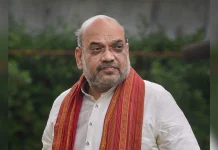Contents of a diary seized at the time of IT raid in Karnataka has now become a talk of the town, because it supplies evidence to a long-running suspicion: Congress high command takes kickbacks from its party leaders in exchange for the benefits they receive from its government.
By Ganashyam
Congress party’s Karnataka unit is facing a unique allegation, which some analysts call “unprecedented”. That’s largely because the documents seized by the Income Tax Department shines light on a track that money went travelled.
The case revolves around a diary belonging to Govindraj, a member of the upper house of the state legislature and a close associate of the chief minister Siddaramiah.
Govindraj’s house was raided in the aftermath of the demonitisation. During the raid officials seized number documents in addition to a diary. In the diary, reports say, he wrote name of the people he gave money to. The names are in their abbreviated form, and they include RG, AICC, SG office, and M Vohra.
Adding to the suspicion is Govindraj’s phenomenal rise in the ranks and files of the party. Although he is not a mass leader and not elected directly from people, he is increasingly being promoted.
Congress party has long been known for corruption. Its previous regime headed by Dr Manmohan Singh is accused of overseeing nearly a dozen frauds, with 2G and coal scandals being the biggest ones in terms of value.
It was long suspected that Congress leaders need to pay their party bosses for everything – from tickets to contest elections to occupy important position in the government.
Going by the contents in the diary, a sum of Rs 3.2 crore was paid to Vohra. It also shows that Rs 6 crore was paid to RG office and Rs 5 crore to SG office. There is also an initial called DGVS.
The opposition parties have seized on this opportunity to expose the ruling Congress, with the BJP raising the issue every day in the ongoing legislative session.
The BJP alleges that the sums mentioned in the diary were in fact kickbacks paid to the Congress high command. Of the Rs 150 crore, Rs 65 crore was paid to the party high command, says the BJP.
The IT raided was conducted in March 2016, almost a year ago. But the diary entries suggest that the transactions were made during the 2014 Lok Sabha elections.
Some people even alleged that the ruling Congress party desperately tried to go ahead with its plan to build a steel flyover in Bangalore because it hoped to use the money it could swindle from the project to fund its expenses in Uttar Pradesh elections.
The proposed steel flyover covering a distance of 6.7 km from Nagawara to Hebbal was to be build at an estimated cost of 1,800 crore. But the project hit a roadblock as environmental activists staged protests across the city. The project was successful scuttled with the leaders from the opposition joined forces with the green speakers.
In an interview to the Economic Times, Sadananda Gowda, Union Minister for Statistics, who is also the former chief minister of Karnataka, alleged that the Siddaramaiah government was in a hurry to carry out the project because the party desperately needs money for the UP elections.
From the beginning, the entire tender process for the steel flyover appeared to be a hush-hush affair. The government first called the tender for such a large project and then took the Cabinet’s approval a few months later.
The Cabinet had not cleared the finances and yet, the tender was called first. The government was also at a loss to explain how the project cost went up from Rs 1,350 crore in June to Rs 1,800 crore by September when steel prices had dropped. The government is now blaming it on VAT. But it’s general knowledge that VAT is supposed to fall when costs fall.
It’s obvious that Congress has deep rooted problems of corruption within the party. The Indian voters have taught it a lesson so harsh to the party that it would be nearly impossible for the party to rise from the ashes. But old habits die hard. Instead of cleaning up its system, the party still tries to crawl its way up through its corrupt practices.
No wonder the party is losing its feeble hold on the country’s politics day by day.
Box Item
History of Corruption
Congress has a long history of corruption. One of the scandals that points towards internal corruption in Congress is the National Herald Scam.
This scandal came to light after Subramanian Swamy sued the Congress Party in a Delhi court. The case is still on, but the modus operandi used by those involved in this affair is an interesting story to read about.
It all began in 2011 when the Congress Party, led by Sonia and Rahul Gandhi, lent Rs 90.25 crore in loan to the Associated Journals Pvt. Ltd, the media group that decades ago published ‘National Herald’. A year later, the Party wrote off the loan asking the publishing group to hand over its controlling stakes to Young Indian, the NGO run by Rahul and his associates.
Every penny in the coffers of the Congress Party is a donation made by industrialists and public in general in return for tax deduction. Can a political party use money to lend loans? Hardly anyone questioned this in 2011. Then the party said it lent money to help the publishing group to re-launch its paper.
But the paper never saw the light of day. And the NGO came to own properties worth several crores.
The Congress Party said it wrote off the loans because it found the publication unable to repay the loan. But it is a wonder as to how a company which owns properties worth several thousand crores is unable to pay a mere Rs.90 crore.
You will find answer to this question if you try to figure out who is the owner of the publishing group. Even the publishing group is owned by the same people who launched the NGO Young Indian.
The known crony of Nehru-Gandhi political dynasty, Motilal Vora, is the chairman of the publishing group. Don’t be surprised if he is also the treasurer of Young Indian. Young Indian has Sonia Gandhi, Rahul Gandhi, Motilal Vora and Oscar Fernandesas its members, with Sonia and Rahul controlling more than 70 percent of the stake. Other members of the board of Young Indian include Suman Dubey, Satyan and Sam Pitroda.
“They are the same people exchanging musical chairs to their benefit,” said Subramanian Swamy in a TV interview.
The Associated Journal, the publishing group of National Herald, owns real estate across the country, from Delhi to Mumbai and Lucknow to Bhopal. Given a conservative estimate, its properties are worth about Rs.5000 crore.
Therefore, Subramanian Swamy says Young Indian is just a front to acquire control over the assets of the publication. Today, Vora is facing the charge of lying to the public that the publication had no money nor assets to repay the loan borrowed from the Congress Party.








